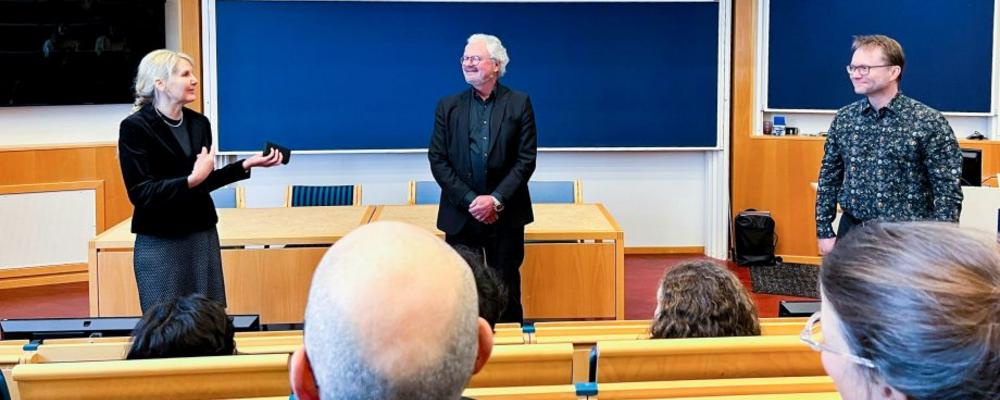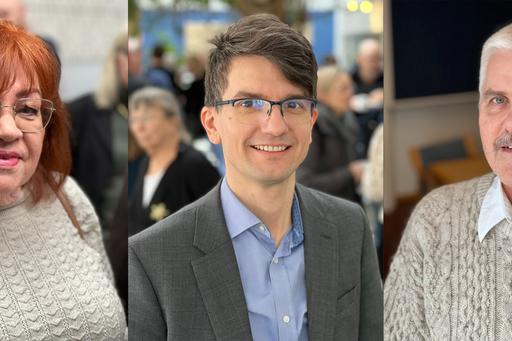
- Home
- News and events
- Find news
- Successful day for research in primary and close care
Successful day for research in primary and close care
For the first time, the School of Public Health and Community Medicine at the University of Gothenburg and Regional Health’s Research, Development, Education, and Innovation organization have held a joint day for researchers in primary care and close care. The event was organized in the Earth Science Centre, which probably will become a new shared premises for both the University and the region next year.
The day started with coffee, where I met one of the doctoral students assembled for the day: Gabor Szalo. He specializes in both general medicine and psychiatry at Tidan Medical Center in Skaraborg. As a doctoral student, he has now reached the midpoint in his thesis work at Sahlgrenska Academy, which includes investigating factors affecting vascular elasticity and its link with future cardiovascular events. He was delighted to have the opportunity to meet other researchers in primary care.
“Especially after COVID-19, it has become very important to meet new colleagues and receive input. I also am really looking forward to the lectures,” Szalo said.

Need to meet
Eva Deutsch, who has long provided administrative support for doctoral studies at the School of Public Health and Community Medicine, also sees the importance for all doctoral students of having the opportunity to meet others in the same situation:
“Doctoral students are scattered around the region, and if you are a doctoral student at a health center, it is easy to feel a little isolated in your role as a doctoral student. Before COVID-19, we had regular doctoral student meetings, but this meeting also attracts researchers who have defended their doctoral theses.”
The Primary and Close Care Research Day was the first to be jointly organized by the University and the region. The event is a complement to the research day that has been organized for many years between Sahlgrenska Academy and Sahlgrenska University Hospital on the research they conduct together.
Strengthening ties
“By allowing the University and the region to grow together more seamlessly, research on primary and close care can be supported, allowing us to make greater gains,” says Ronny Gunnarsson, a specialist doctor and professor of general medicine at the University of Gothenburg. He was the main person responsible for the research day.
He described how the research day is an important element in an ongoing effort to strengthen ties between the University of Gothenburg and the region in primary and close care.
“What we see now is the beginning of deeper collaboration. We probably will also be moving in with the Gothenburg part of Regional Health’s Research, Development, Education, and Innovation unit here in the Earth Science Centre next year. We have not signed the leasing agreements yet, but I usually say it is 99.9 percent done, because all the parties have clearly indicated they want to come together in this building,” Gunnarsson said.
International visit
The day included many interactive activities and several sessions and workshops. In the morning, doctoral students and prospective doctoral students met for discussions and conversations about what it is like to be doctoral student. The doctoral students split up into three sub-groups, depending on what stage they were in their graduate studies, and the groups then discussed different questions, first within the group and then with those having more experience as doctoral students. The completely new doctoral students were asked to discuss what they think will be required of them, while those farther along in their studies had such topics as who bears the main responsibility for the research in the project, the doctoral student or the supervisor.
Researchers who had already completed their doctoral degrees met in another room for a panel discussion, which included international guest Simon Griffin (a professor of general medicine at Cambridge University), together with Professor Emeritus Ulf Lindblad and Associate Professor Bledar Daka. The panel took questions from the audience and discussed issues related to the journey from doctoral thesis to associate professor. The discussion dealt with how to recruit doctoral students and how to best support them. The panel also discussed co-authorship and how to work strategically for better results when applying for research funding. Part of the answer is involvement in groups that influence the direction of different calls for proposals so that a proposal has a better chance of dovetailing with the call.
Simon Griffin also lectured on complex interventions, and Jan Borén, a professor and head of the Institute of Medicine, gave a presentation entitled “Successfully applying for research grants.”
The meeting attracted close to one hundred attendees, and organizers hope to increase this number at the next research day. The University and the Research, Development, Education, and Innovation unit already have already begun planning a new meeting this autumn. Make note of the date now: October 18, 2023.
BY: ELIN LINDSTRÖM